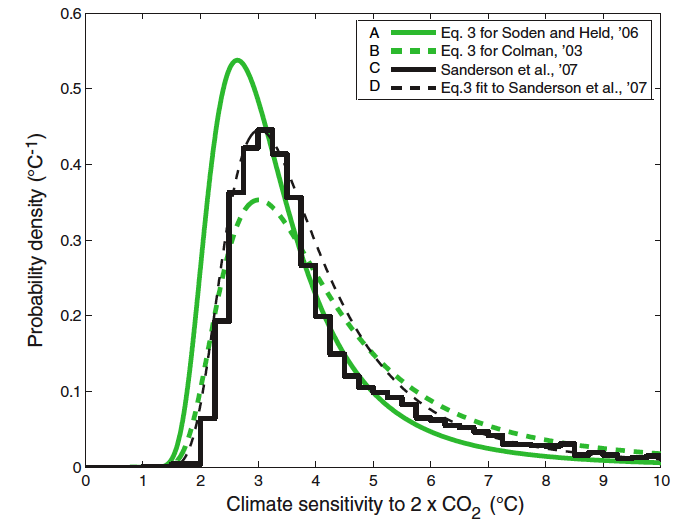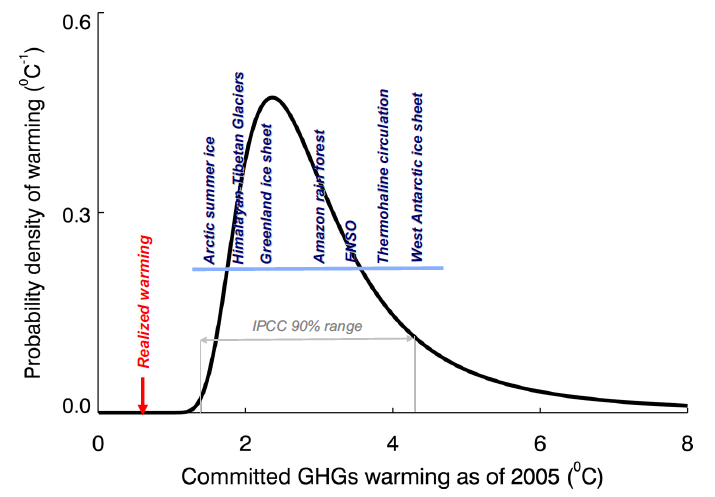Prudent Risk
Posted on 26 February 2011 by dana1981
 In their recent letter to US Congress, a group of "skeptic" scientists argued that based on what they deemed the "modest warming" so far, and that the consequences of that warming have thus far been manageable, the "prudent path" forward involves continuing with business-as-usual. However, as the first Prudent Path Week post noted, we're primarily concerned about the warming and climate change that are yet to come.
In their recent letter to US Congress, a group of "skeptic" scientists argued that based on what they deemed the "modest warming" so far, and that the consequences of that warming have thus far been manageable, the "prudent path" forward involves continuing with business-as-usual. However, as the first Prudent Path Week post noted, we're primarily concerned about the warming and climate change that are yet to come.
Determining the prudent path forward requires not just looking at the changes which have occurred so far, but also assessing the risks to come and weighing the costs vs. benefits of addressing them. That's what we will attempt to do in this article.
Probability of Future Warming
The "skeptic" letter to Congress focuses on the 0.8°C warming of surface air temperatures we've seen so far. However, there still remains unrealized warming "in the pipeline" based on the greenhouse gases we've already emitted. How much unrealized warming depends on the climate sensitivity to the energy imbalance caused by the increase in greenhouse gases. Roe and Baker (2007) examined the probability distribution of climate sensitivity values:

Figure 1: Climate sensitivity distributions from Roe and Baker (2007)
However, Annan and Hargreaves (2009) concluded that there is a 95% probability that climate sensitivity to a doubling of atmospheric carbon dioxide (CO2) is very unlikely to be more than 4.5°C. Note that this excludes slower-acting feedbacks such as melting ice, which Hansen et al. (2008) concluded increases the long-term climate sensitivity to approximately 6°C for CO2 doubling. However, for our purposes we will consider the short-term 4.5°C sensitivity a plausible worst case scenario.
This high climate sensitivity value poses a very large potential risk. In the business-as-usual scenario promoted by the "skeptics", the atmospheric CO2 concentration would be around 850 parts per million in 2100. This represents more than a doubling of atmospheric CO2 over the next 90 years.
Hot Math
The math is not in our favor. The planet has already warmed 0.8°C with another 0.6°C to come from current CO2 levels. Even in a best case scenario, if we continue with business as usual, the planet will warm a further 2°C over the next 90 years. This puts us well beyond the global warming 'danger limit' even in the best case scenario pushed by the "skeptics". In the worst case scenario, we could be looking at 7°C global warming from pre-industrial levels by 2100.
Ramanathan and Feng (2008) applied the Roe and Baker climate sensitivity distribution to some important predicted climate tipping points, as shown in Figure 2:

Figure 2: Probability distribution for the committed warming by GHGs between 1750 and 2005 from Ramanathan and Feng (2008). The normalized distribution is calculated from the probability density function given by Roe and Baker (2007), and the mean and standard deviation of the uncertainties associated with feedback processes are fitted for Sanderson et al. (2007). Shown are the climate-tipping elements and the temperature threshold range that initiates the tipping.
This distribution is based on the warming that we're committed to just based on the greenhouse gases we've emitted thus far. Ramanathan and Fang note that aerosols are likely offsetting a significant amount of global warming, and have a very short lifetime in the atmosphere. So as countries continue to clean their air, aerosols in the atmosphere will quickly decrease, leading to further warming. Ramanathan and Fang estimate that we are most likely already committed to 1.6°C additional warming, which appears sufficient to trigger the eventual collapse of the Greenland Ice Sheet, the Himalayan Tibetan glaciers, and summer Arctic sea ice, among other consequences.
Unconvincing Skeptics
As Bart discussed in the second Prudent Path Week post, aerosols represent a significant uncertainty - one which the "skeptics" try to have both ways, arguing that it's both significantly higher and lower than the IPCC estimates. This aerosol uncertainty is one of the biggest contributors to the large range of possible climate sensitivity values. But even in a best case scenario we are already committed to a dangerous amount of warming. And in a risk assessment, one must also consider the likely and worst case scenarios. In our case, they are not pretty.
As we saw in the third Prudent Path Week post, the "skeptics" have given us little reason to believe that the unlikely low climate sensitivity values are a reality. In fact, on climate sensitivity and aerosols, in their letter to Congress the "skeptics" contradicted themselves by a factor of ten. As Andy showed in the fourth Prudent Path Week post, the carbon cycle feedbacks may cause atmospheric CO2 to rise even faster than the IPCC expects. And as Robert showed in the fifth Prudent Path Week post, we're already seeing significant consequences from the "modest" warming thus far, as the polar regions are both warming and losing ice extensively.
Not only do the "skeptics" want us to ignore the plausible worst case scenarios, but they want us to ignore the most likely scenario. They want us to continue behaving as if there's nothing to worry about. Is this really prudent? That partially depends on the costs of averting climate change.
Costs vs. Benefits
In case you're still not convinced about the prudent path forward, it's worth evaluating every possible scenario. Even if the "skeptics" are right and the better-than-best-case scenario is reality, the costs of reducing carbon emissions are quite small. Moreover, there are additional ancillary benefits to doing so, such as addressing ocean acidification and peak oil. If the "skeptics" are wrong, the benefits of reducing carbon emissions will outweigh the costs several times over. If they're wrong and we fail to act, the most likely scenario is disastrous, and the worst case scenario is catastrophic.
The risks are very asymmetrical. Not only is it more likely that if our estimates of climate sensitivity are wrong, the sensitivity is higher than we think, but the consequences of no action are far worse than the consequences of taking action. The two worst scenarios are:
- if the "skeptics" are right and we limit carbon emissions - in which case the costs will be minimal and we'll still reap the benefits of addressing peak oil, ocean acidification, and other pollutant emissions.
- If the "skeptics" are wrong and we take no action - in which case we will likely experience catastrophic climate change this century.
What's Prudent?
Consider the following analogy: you're driving your car, and you start to feel that the brakes aren't working quite properly. Most people would agree that the prudent path involves spending a modest amount of money to take the car to a mechanic, because if the brakes go out, it presents a potentially catastrophic scenario. This sort of preventative action is good risk management.
In this case we're dealing with the global climate, on which every living thing on the planet relies, and we're facing a disaster in the most likely scenario if we continue on the business-as-usual path which the "skeptics" tell us is "prudent". The "skeptics" would have us continue driving the car in the blind hope that the brakes will never give out. After all, we haven't gotten into a wreck so far, so continuing to drive with faulty brakes must be safe!
To sum up:
- If we continue in a business-as-usual scenario, the results range from bad to catastrophic.
- The cost of reducing carbon emissions and changing paths is minimal.
- The benefits of reducing carbon emissions outweigh the costs several times over.
- In trying to make their case to continue on the business-as-usual path, the "skeptics" contradicted themselves on major issues. By a factor of ten. Twice.































 Arguments
Arguments























 0
0  0
0 Image from here.
Image from here.







Comments